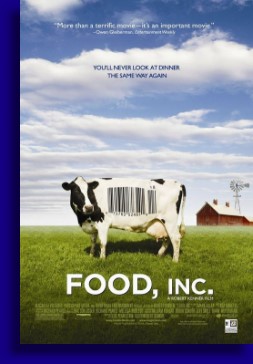

Reviewed by
Christopher Armstead

Monsanto Corp. owns the soybean? Really? Often when I watch these expose type documentaries, considering that I am reasonably well read, they simply go about reinforcing things that Iím already aware of and in some instances director Robert Kennerís documentary ĎFood Inc.í does the same. But this movie also gives me info that I had no earthly clue about, such as Monsanto owning the soybean. How awesome is that? Kenner goes into exquisite detail on how Monsanto pulled off owning a ubiquitous plant thatís almost in everything we eat, but the concept of it is still blowing my small mind. Itís almost like someone patenting and owning oxygen. You see your oxygen is flawed but my altered oxygen is way better because it gives you more air to breathe. Soon almost everybody is using my oxygen except a few of you jerk-off hold outs who have something against chemically altered oxygen but guess what? Because my oxygen is everywhere, chances are that by accident youíre going to breathe some of it and thatís when I sue your ass because my oxygen secret agents are out there monitoring you clowns that wonít jump on board. Oh, and for you people who have already jumped on board, donít even think about trying to save some of my leftover oxygen to use tomorrow because I wonít allow that. You need to buy fresh oxygen baby. Or I will sue your ass! And since Iím rich I will win over and over again because the justice system works for me, not you sucka! Yeah, you could try to go grass roots and get a law passed or something but my former CEO of Altered Oxygen Corp is now the Government Chief of Oxygen Regulation Standards. Good luck. Seriously, how awesome is that?
Food Inc., which is consistently informative and entertaining, goes through the process of telling us how the McDonald Brothers fundamentally changed the way that food is processed in this country, the unintended consequences of these changes and how the monopolistic practices of a few megacorps that control the majority of the industry and how they profit immensely from these changes.


The scope in this film is fairly broad so it covers a lot ground while focusing on very little. This isnít a movie about slaughterhouse atrocities but we do get to see cows standing knee deep in their own feces, chickens genetically altered to be so fat so fast that they can barely walk before they collapseÖ while still being damn tastyÖ and we also get a brief look at the hog killing floor. If that thing isnít a crazy contraption of massive death I donít know what is.
So while the movie isnít a treatise on the effect of our poor eating habits it does mention how fat we are getting, how Type 2 Diabetes has become near pandemic and the odd phenomena that buying a bushel of carrots is more expensive than hitting the drive thru and getting a value meal. This leads to another thing that I only recently became aware of and that is how many people eat fast food for dinner. Everyday, we as a family cook dinner, sit down and eat, and itís been that way in my family since before I was born and I hope it will continue to be that way. Part of the reason for this is that Iím a pretty damn good cook and thereís nothing that a fast food restaurant makes that I canít make better, other than McDonaldís French Fries. Canít touch those. Not that the food I buy and prepare is any different from that food they serve at burger joints since they all come off the same genetically altered assembly lines. But one day after work, I was heading to the driving range and decided to stop off to Mickey Dís and get something quick, only to find the drive thru line wrapped around the building. All these fine American Citizens are in line to eat dinner at McDonalds. Crazy. I do eat fast food on occasion but itís basically a lunch thing, and thatís only when I oversleep and donít have the time to make something, but then we see the family in this movie who eat fast food everyday. Partly because itís fast and they donít have the time and partly because hitting Burger King is cheaper for them than buying better quality food and preparing it themselves. Tragic.
So with the genetically altered food, our government working against us to keep us sick and poisoned, mad cow, e-coli tainted spinach and peanut butter, undocumented food workers being treated like garbage and mega corporations giving nary a care as long as profits go up does ĎFood Inc.í offer any solutions? No, not really. Like most of the films glossing over on subjects thereís a small section on organic food and the benefits of organics and how even Wal-Mart has jumped on the organic program. The filmmakers also encourage us to try enact changes in the industry similar to way the huge tobacco companies had to buckle under public pressure. This argument may be a bit disingenuous if only because not everybody smokes but everybody has to eat, so convincing Americans to give up food that is cheap and plentiful, at least on the surface, for food that is healthy and naturalÖ thatís a challenge.
Regardless, ĎFood Inc.í was a very informative and very a entertaining documentary on the food industry telling us where we are today with what we eat. A lot of what we see in this movie isnít new information and it covers a lot of issues in a short amount of time, but this is a style that makes this movie uniquely approachable by pretty much everyone, and if enough people see this and are affected by it then maybe, just maybe something good could happen from it.

